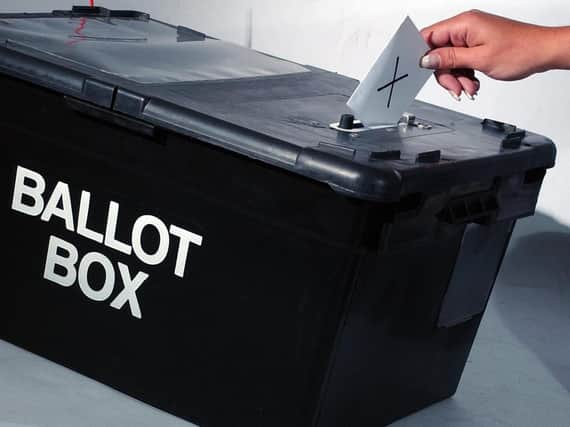Owen Polley: It would be stupid of the UK to set out the criteria for holding a border poll


When the Northern Ireland Office (NIO) minister, Steve Baker, suggested recently that a grave decision like breaking up the UK should ideally require a supermajority (ie more than 50.1%), he was pilloried. In contrast, last week the Belfast Telegraph pushed a finding in its latest opinion poll – that 55% of respondents wanted the government after the next election to set out criteria for calling a referendum.
Neither of these things are provided for in the Belfast Agreement, or the legislation that implemented it.
Advertisement
Hide AdAdvertisement
Hide AdThe text of the Good Friday deal specified that, “if the wish expressed by a majority (in a referendum)... is that Northern Ireland should cease to be part of the United Kingdom…,” the government should enact this decision.
According to the agreement, a poll should be held, if at any time ‘it appears likely’ to the secretary of state that a majority of voters here want to become part of a separatist all-Ireland republic. That decision is entirely at the minister’s discretion and there is no need for him to set out any criteria. Indeed, it would be perfectly reasonable and legal for the secretary of state to never call a ‘border poll’.
As Ben Lowry has pointed out on these pages, it’s extraordinary enough that the UK accepted in theory that its devolved regions could break-up the Union unilaterally, through a one-off vote. It’s an example, arguably, of an innate sense of British fairness, tolerance and pluralism that can at times tilt into weakness.
If the simple majority clause of the Belfast Agreement has to be respected, as we are so often told, then so too should the secretary of state’s right to make a decision on any border poll without setting out prior conditions.
Advertisement
Hide AdAdvertisement
Hide AdThat’s not to say that the top NIO post is always held by a reliable politician with the best interests of the Union at heart. Many secretaries of state have shown staggering naivety in the face of nationalist demands and towering insensitivity to Northern Ireland’s integral place in the UK. Now, we have one who is urging us to accept a border that separates us economically from the rest of our country.
Since Brexit, meanwhile, separatists’ demands for a referendum have become more intense and the broadcast media, in particular, have given credence to the idea that a poll is inevitable. A blatantly political campaign has too often been treated as if it were a genuine debate.
The government, so far, has resisted this lobbying, but, as we’ve seen before, politicians at Westminster are prone to being worn down by the endless grievance-mongering of Irish nationalism. There’s no guarantee that this won’t happen again with the referendum. But it would be particularly stupid to set tests that automatically trigger a damaging and divisive campaign.
There are many threats currently that could erode the Union, even though a comfortable majority still supports our place in the UK. The Northern Ireland Protocol, for example, is a virus that will eat away at our constitutional position, while circumventing the principle of consent.
Advertisement
Hide AdAdvertisement
Hide AdIt’s true too that some attitudes are becoming more common that encourage those who want to destroy Northern Ireland.
They include complacency about the advantages of being in the UK, sometimes expressed by those who benefit from them most. This is linked closely to a sense of entitlement that pervades our political culture. The assumption that, however much we get from Westminster, we’re a special case and deserve more.
These are the ways of thinking that undermine our links to the rest of the UK.
Ironically, the supposed attractions of the Republic of Ireland are often exaggerated by the fact that we’re engaged far more in British politics and focus exculsively on its flaws and controversies.
Advertisement
Hide AdAdvertisement
Hide AdThere is widespread naivety, as a result, about the social issues facing the south and the anti-British sentiments that shape its society.
In Dublin last week, the Dunmanway Discussion Group hosted the ‘Irish Protestant Minority Experiences Conference’.
This organisation has striven, with limited success, to persuade the Republic’s government and its civil society to acknowledge the legacy of the Bandon Valley Massacre. In the period just after the War of Independence, but before the Irish Civil War, thirteen protestants were massacred by the IRA in west Cork, prompting hundreds more to leave the area for Great Britain or Northern Ireland.
There is still huge institutional resistance to acknowledging the hurt that this incident, and its misrepresentation, caused to the southern minority community. Indeed, the fearless veteran journalist, Eoghan Harris, told the conference that “a complete silence fell over the country (i.e. southern Ireland)” about the departure of much of its Protestant population, in the early part of the last century.
Advertisement
Hide AdAdvertisement
Hide AdThese nuances are rarely picked up in Northern Ireland, even though, if you believe some media, we’re already engaged deeply in a debate about the relative merits of being part of the UK, as against being annexed by the Republic. That is simply not true and, if it were true, there would be more discussion of our neighbour’s willingness and ability to absorb a substantial population of British people, against its will.
Like so many aspects of the ‘debate’ about a ‘border poll’, one-sided spin and propaganda are presented as a ‘conversation’. The government, unionists and Northern Ireland’s public should not be afraid to call out these distortions and refuse to be manipulated.